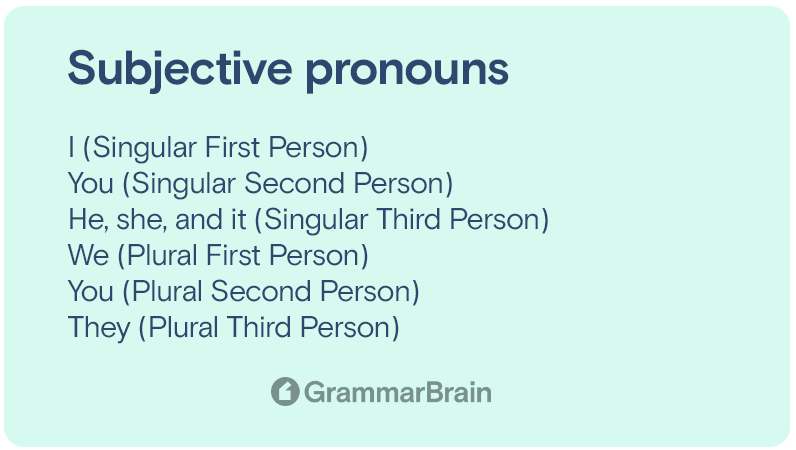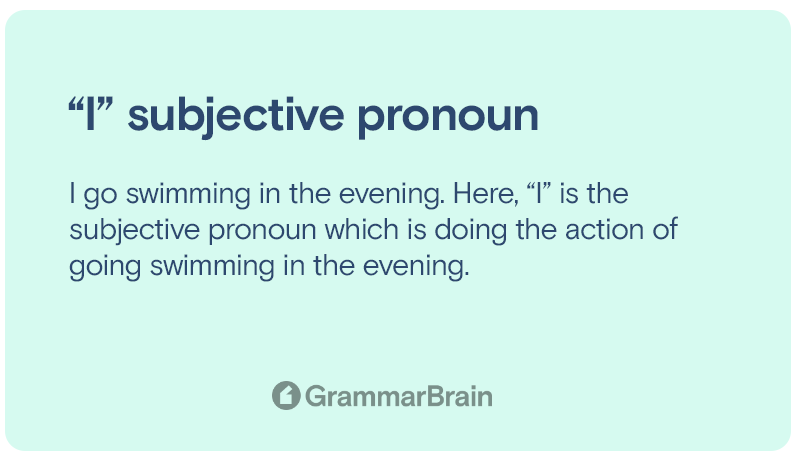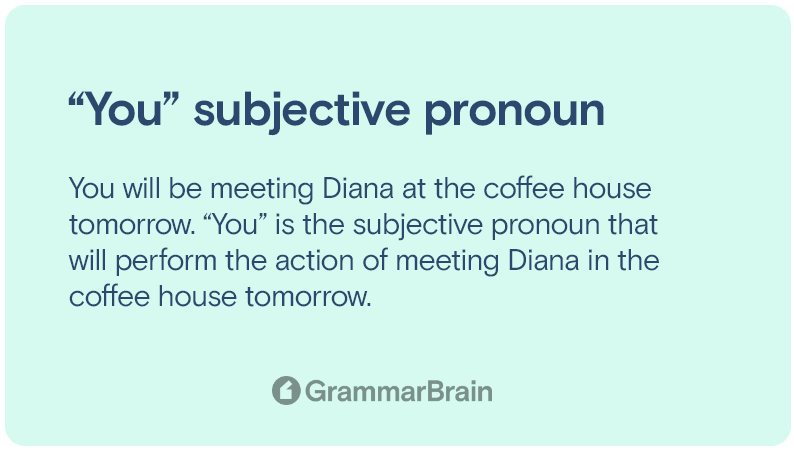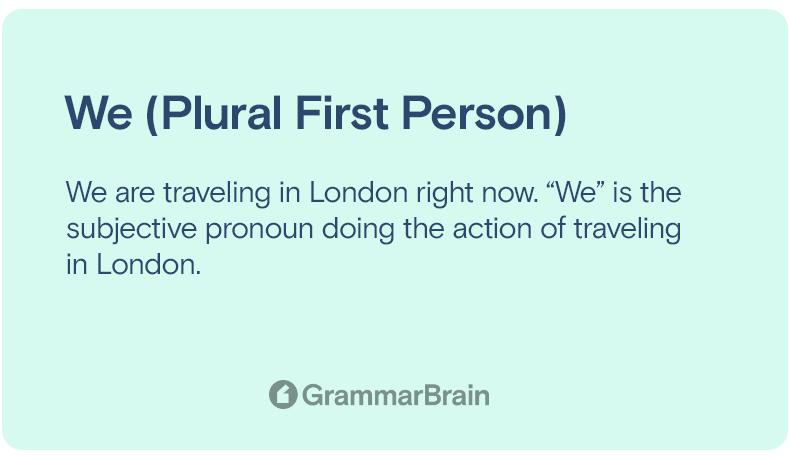What are subjective pronouns? In English grammar, there are different types of pronouns like objective, possessive, interrogative, etc., and subjective pronouns are among them. Subjective pronouns take the place of the subject in a sentence and perform the action in a sentence.

What are the common subjective pronouns in English grammar?
Subjective pronouns are depicted in the first person, second person, or third person and are either singular or plural. Here is a list of common subjective pronouns in English grammar.
- I (Singular First Person)
- You (Singular Second Person)
- He, she, and it (Singular Third Person)
- We (Plural First Person)
- You (Plural Second Person)
- They (Plural Third Person)
Here are a few examples of each of them.
Examples of different types of subjective pronouns

I (Singular First Person)
- I go swimming in the evening. Here, “I” is the subjective pronoun which is doing the action of going swimming in the evening.
- I drink a liter of water every day. Here, “I” is the subjective pronoun which is doing the action of drinking water every day.
- I performed the dance recital at college yesterday. Here, “I” is the subjective pronoun that has completed the action of performing a dance recital.
- I eat bananas before going to college every day. Here, “I” is the subjective pronoun that is doing the action of eating bananas before going to college every day.

You (Singular Second Person)
- You will be meeting Diana at the coffee house tomorrow. “You” is the subjective pronoun that will perform the action of meeting Diana in the coffee house tomorrow.
- You told Ian to sit on the chair. “You” is the subjective pronoun and, “told” is the action verb.
- You hit the ball out of the park. The subjective pronoun is “You”, and the action verb is “hit”.
- You make delicious chocolates. Here, “You” is the subjective pronoun, and “make” is the verb.
He, She, And It (Singular Third Person)
- He joined the Karate club yesterday. “He” is the subjective pronoun that performed the action of joining the Karate club yesterday.
- He carried a heavy bag on his shoulders. Here, “He” is the subjective pronoun, and “carried” is the verb.
- She rides a cycle in the park every day. “She” is the subjective pronoun doing the action of riding a cycle every day.
- The medicine is very powerful. It cured John’s illness within a day. Here, “medicine” is the subject. In the next sentence “it” replaces “medicine” making it the subject. This subjective pronoun has performed the action of curing John’s illness.

We (Plural First Person)
- We are traveling in London right now. “We” is the subjective pronoun doing the action of traveling in London.
- We ate banana pudding for lunch yesterday.
- We sit together when we eat. “We” is the subjective pronoun and “sit” is the verb.
- We bought a car yesterday. Here, “We” is the subjective pronoun, and “bought” is the verb. In the sentence, the subjective pronoun carried the action of buying a car yesterday.
They (Plural Third Person)
- They will be watching the match in the stadium tomorrow. The subjective pronoun is “They” which will perform the action of watching the game in the stadium tomorrow.
- They danced at the party with full energy. In this sentence, the subjective pronoun has performed the action of dancing at the party.
- They burst crackers after the Australian team won the football match. The subject performed the action of bursting crackers when the Australian team won the football match.
- They played football on the ground after college hours. Here, the subjective pronoun is “They” and the verb is “played”. The subjective pronoun completed the action of playing football on the ground.
What is the difference between subjective pronouns and objective pronouns?
- The main difference between a subjective and objective pronoun is that the subjective pronoun performs the action whereas the objective pronoun receives the action.
- An example of an objective pronoun is “She gave me a pair of shoes last month”. In this sentence, “Me” is the objective pronoun which is receiving a pair of shoes. On the other hand, an example of a subjective pronoun is “He eats cereals every morning”. In this example, the subjective pronoun is performing the action of eating cereals every morning.
FAQs
What is the difference between subjective pronouns and possessive pronouns?
- A subjective pronoun replaces the subject in a sentence and performs the action whereas the possessive pronoun tells about a person owning something.
- Subjective pronouns are I, you, he, she, we, and they. In comparison, the possessive pronouns are mine, hers, ours, yours, and theirs.
How many types of pronouns are there in English grammar?
There are quite a few pronouns in English grammar. Here is a list of a few.
- Subjective Pronouns
- Objective Pronouns
- Possessive Pronouns
- Interrogative Pronouns
- Demonstrative Pronouns
- Indefinite Pronouns
- Relative Pronouns
- Reflexive Pronouns
- Intensive Pronouns
Sources
- Pronouns: Subjective, Objective, Possessive, Demonstrative, & More
- Subjective & Objective Pronouns
- Subjective Personal Pronouns: Explanation And Examples
- Subject Pronouns – Explore Definition And Examples
- Pronouns: subject, object & possessive pronouns
Inside this article
Fact checked:
Content is rigorously reviewed by a team of qualified and experienced fact checkers. Fact checkers review articles for factual accuracy, relevance, and timeliness. Learn more.
Core lessons
Glossary
- Abstract Noun
- Accusative Case
- Anecdote
- Antonym
- Active Sentence
- Adverb
- Adjective
- Allegory
- Alliteration
- Adjective Clause
- Adjective Phrase
- Ampersand
- Anastrophe
- Adverbial Clause
- Appositive Phrase
- Clause
- Compound Adjective
- Complex Sentence
- Compound Words
- Compound Predicate
- Common Noun
- Comparative Adjective
- Comparative and Superlative
- Compound Noun
- Compound Subject
- Compound Sentence
- Copular Verb
- Collective Noun
- Colloquialism
- Conciseness
- Consonance
- Conditional
- Concrete Noun
- Conjunction
- Conjugation
- Conditional Sentence
- Comma Splice
- Correlative Conjunction
- Coordinating Conjunction
- Coordinate Adjective
- Cumulative Adjective
- Dative Case
- Determiner
- Declarative Sentence
- Declarative Statement
- Direct Object Pronoun
- Direct Object
- Diction
- Diphthong
- Dangling Modifier
- Demonstrative Pronoun
- Demonstrative Adjective
- Direct Characterization
- Definite Article
- Doublespeak
- False Dilemma Fallacy
- Future Perfect Progressive
- Future Simple
- Future Perfect Continuous
- Future Perfect
- First Conditional
- Irregular Adjective
- Irregular Verb
- Imperative Sentence
- Indefinite Article
- Intransitive Verb
- Introductory Phrase
- Indefinite Pronoun
- Indirect Characterization
- Interrogative Sentence
- Intensive Pronoun
- Inanimate Object
- Indefinite Tense
- Infinitive Phrase
- Interjection
- Intensifier
- Infinitive
- Indicative Mood
- Participle
- Parallelism
- Prepositional Phrase
- Past Simple Tense
- Past Continuous Tense
- Past Perfect Tense
- Past Progressive Tense
- Present Simple Tense
- Present Perfect Tense
- Personal Pronoun
- Personification
- Persuasive Writing
- Parallel Structure
- Phrasal Verb
- Predicate Adjective
- Predicate Nominative
- Phonetic Language
- Plural Noun
- Punctuation
- Punctuation Marks
- Preposition
- Preposition of Place
- Parts of Speech
- Possessive Adjective
- Possessive Determiner
- Possessive Case
- Possessive Noun
- Proper Adjective
- Proper Noun
- Present Participle
- Prefix
- Predicate



